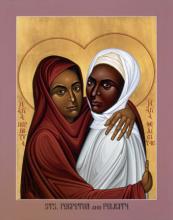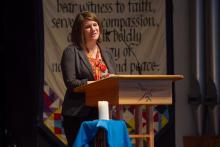egalitarianism

THREE YEARS AGO, I joined a struggle for what I view as the most transformational justice reform today: change to the U.S. Constitution. The change I advocate is at once unbelievably simple and profoundly radical: for Americans to agree that all citizens enjoy equal rights under law, whatever their gender or sexual orientation. It’s time to recognize the Equal Rights Amendment. Equality is central to most contemporary theories of justice. A majority of Americans puzzle why our nation has failed to live up to the promise of equality in our democracy. So why aren’t women protected equally?
“The ERA is dead,” opponents argue, laid to rest by an arbitrary time limit that was negotiated into the prelude of the bill Congress passed in 1972. A procedural objection seems a weak theory to lead with, in response to the unrequited aspirations of half the citizenry for basic human rights. Whatever the amendment’s merits, many claim, it cannot be revived. And yet miraculously, it has been. And women everywhere are testifying to this resurrection.
This is fitting, isn’t it? It was women, after all, who first testified to the resurrection. This Easter, we read how Mary Magdalene and the other Mary meet an angel at Jesus’ tomb, who commissions them to tell the disciples he is risen. The guards are too terrified to move, but the women rush to fulfill their divine calling (see Matthew 28).

When first married, my wife and I joined a PC(USA) church, partially out of our commitment to male-female equality. So at our new members’ class when we were asked, in a darker-timeline version of a mixer, to try and name the apostles from memory, the table my wife and I were at came up with twenty apostles (not quite what the leader had in mind). The Twelve, plus Matthias, Paul, Barnabas, Silas, Timothy, Apollos, Andronicus, and of course — not to leave out my wife’s favorite — Junia.

I have two daughters.
They are little spark plugs of utter joy and complete chaos. They make me laugh. They make me cry. They remind me to view the world through childlike wonder. They remind me that I am not what I do, but who I am. They teach me what selfless love actually looks like … every day … day after day … early morning after early morning … nasty crap diaper after nasty crap diaper. They make me realize how much I have to learn about parenting and our place in the world.
Most every night from the moment they were born, I have quietly held them in my arms or rested my hand on their backs while they sleep and prayed for them.
I pray for their continued breath. I pray for their development as little, unique human beings. I pray the Spirit of God to fill them and empower them. I pray the Lord’s Prayer over them. I pray for them to be protected from evil. I pray for them to love those who aren’t often loved. I pray for them to live confidently into who they have been created to be, free from the pressure of imposed reputation and expectation.
I pray for their past, present and future.
In learning to love these little girls, I began to ask more and more questions about the place of women in the world, in the church, and in everyday life.

You can certainly get community outside of church, says bestselling author and blogger Rachel Held Evans, but that doesn’t mean it’s not worth being part of a church community.
“Church forces us into relationship with those who are different than us,” Rachel told Sojourners. As a follower of Christ, she said, I have to be ready and willing to be in community with those who are different than me.
I recently caught up with Evans at Eastern Mennonite University in Harrisonburg, Va. It was her ninth public appearance in the eight weeks as she bounced from Texas and the Midwest to the East Coast and back to Texas, with a foray to Michigan.
Rachel has made her career out of vocalizing what others are feeling, but can’t articulate quite as clearly.

Violence against women is the most prevalent and the most hidden injustice in our world today. From rape as a weapon of war, to human trafficking, to the attack of a young girl seeking an education, the treatment of women and girls across the globe is in a state of crisis.
And we don't even need to leave our own shores to encounter staggering statistics. Here in the U.S., 1 in 5 women have been raped in their lifetime — a number that only jumps when you realize that 54 percent of sexual assaults are never reported. More than 1 in 3 women have experienced some kind of intimate partner violence. Sexual assaults in the U.S. military continue to rise — with an estimated 26,000 in 2012 alone — even as its leaders claim to be addressing the epidemic.
As I lay out in my book On God’s Side, what has been missing from this narrative is the condemnation of these behaviors from other men, especially men in positions of power, authority, and influence — like those in our pulpits. In a section of that book, I say we need to establish a firm principle: the abuse of women by men will no longer be tolerated by other men. The voices of more men need to join the chorus to make that perfectly clear.
It's time for all people of faith to be outraged.

Growing up, I looked to my dad as the quintessential definition of what a man was. He was pretty quiet but prone to anger. He worked crazy hours as the primary provider in the house, but still made time to build things nearly every weekend around the house. He had tons of tools, knew everything about everything and was never, ever wrong.
Some of what he was to me was passed along; most of it didn’t stick. And for that, I was pretty sure there was something wrong with me. Maybe I was gay. Could be that I just missed out on some critical “male gene” that made me want to work with tools and amass an encyclopedic knowledge about sports. I mean, I liked baking with my nana, and when I stayed over at their house for the weekend, sometimes I’d even paint my nails with her polish. I also went golfing and fishing with granddad, but I’d rather draw or play music than help my dad rebuild the retaining wall around the porch.
Must be something wrong with me.

Editor's note: This is a He Said, She Said on the issue. To read this author's wife's take, go HERE.
My wife and I have been embroiled in a deep debate lately. It involves gender roles, complementarianism, egalitarianism, and often threats of a kick landing somewhere on my body. It’s not that we haven’t worked this sort of thing out within our marriage — I take out the trash, she does the laundry — but somehow despite both being raised in Christian households we do not see theologically quite eye to eye on this issue.
I happen to fall on the side of complementarianism. For me this does not threaten the basic equality or God-given image and sense of worth that belongs to all humankind. But I do happen to think men and women were designed differently biologically and otherwise. Yesterday morning in yoga, I did my downward dog alongside 15 women and one other guy. I work in the same building as a special needs school with 22 female teachers and only one dude. I am happy to say that there are some areas women seem to be drawn toward, and in my opinion, excel in.
My wife on the other hand would like to argue (and does) that to pointing out any differences whatsoever leads necessarily to thinking in terms of an inequality. She believes that many of the Biblical mandates on gender roles have more to do with timing and culture than God-given norms.

I was watching this recent video where Tim Keller (along with Don Carson and John Piper) addresses why The Gospel Coalition is explicitly complementarian (a nice way to say that they don't believe in gender equality). Why do they see this as something that a group that is supposed to be focused on the Gospel would need to stress?
Keller begins by saying that he does not think the issue of gender roles are directly part of the Gospel, and acknowledges that bringing it up in the context of answering a person's questions of what it would mean to be a Christian could "certainly muddy the waters."
So why the focus then? He says it has to do with how we read Scripture.

Five of my female Facebook friends had posted the article in a span of about two hours. The headline, “Why Women Still Can’t Have It All,” stared at me, daring me to respond.
Read it, first. Then come back here. Go ahead, take the half-hour (it’s a long one). Read the WHOLE thing.
Back?
OK, so there are some good points in there, right? If you want to be a political power player in Washington, D.C., forcing you to live long-distance from your husband and children, maaaaybe you’re not going to be the happiest person ever. Maybe you can’t “have it all.”
But why is that the question to begin with? Why does this topic of conversation perennially rear it’s head to make women feel like they’re not doing it right? And why is the question never asked of men?